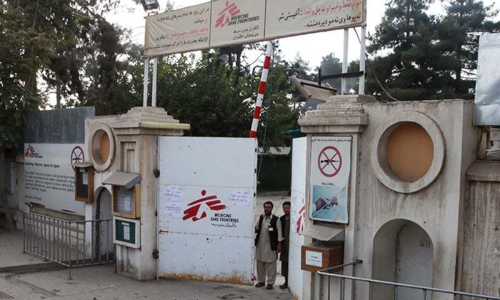WASHINGTON: A deadly US air strike in Afghanistan last year that destroyed a hospital run by Doctors Without Borders did not amount to a war crime but was caused by human error, equipment failure and other factors, a US military report released on Friday concluded.
Forty-two people were killed and 37 were wounded during an October 3 strike that destroyed the hospital run by the international medical charity Medecins Sans Frontieres (MSF), known as Doctors Without Borders in English.
An initial US investigation in November found that U.S. forces had meant to target a different building in the city of Kunduz and were led off-track by a technical error in their aircraft's mapping system.
“The investigation concluded that certain personnel failed to comply with the rules of engagement and the law of armed conflict,” General Joseph Votel, commander of US Central Command, said in a news briefing on Friday to release the final report.
“However, the investigation did not conclude that these failures amounted to a war crime.” This is because none of the service members were aware that they were striking a hospital, Votel said.
The incident was caused by “unintentional human errors, process errors, and equipment failures,” he said. Fatigue and “high operational tempo” were also factors, he added.
MSG President Meinie Nicolai responded in a news release that the briefing amounted to “an admission of an uncontrolled military operation in a densely populated urban area, during which US forces failed to follow the basic laws of war.”
MSF said the disciplinary action announced on Thursday against 16 service members over the air strike, including a general, was too light.
It is “out of proportion to the destruction of a protected medical facility,” MSF said.
The report said condolence payments had been made to more than 170 individuals and families and $5.7 million had been approved to reconstruct the MSF facility.
Votel said $3,000 had been paid for those injured, and $6,000 for those killed.
Many victims of the strike in Afghanistan said in interviews that they were unsatisfied with the findings and actions being taken by the United States.
“There's a lot of talking without much happening,” said Obaidullah Nazari, who survived in the basement when his brother, a patient at the hospital, died in the attack.
Votel said that even though fewer U.S. forces were on the ground than in previous years, he was comfortable with the ability of the military to evaluate risk factors.
The Obama administration plans to keep 5,500 troops in Afghanistan into 2017 for training and counter-terrorism operations, down from about 9,800 now.
The report said General John Campbell, who was then head of US and Nato forces in Afghanistan, took action against 12 personnel involved in the strike.
“The actions included suspension and removal from command, letters of reprimand, formal counseling and extensive retraining,” the report said.
The other personnel were investigated by Votel.














































